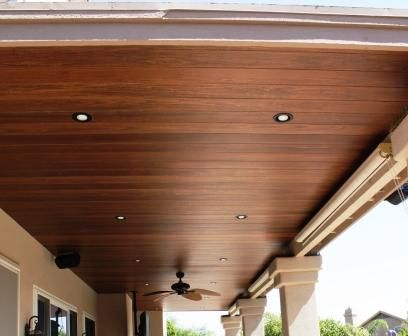Are you considering adding a touch of warmth and natural beauty to your outdoor space with a wooden ceiling? Choosing the right type of wood is essential for ensuring durability, weather resistance, and aesthetic appeal. In this guide, we’ll explore the best types of wood for outdoor ceiling projects to help you make an informed decision.

Understanding the Importance of Wood Selection for Outdoor Ceilings
When it comes to outdoor ceilings, selecting the appropriate wood is crucial due to exposure to elements such as sunlight, moisture, and temperature fluctuations. The right type of wood can withstand these environmental factors and maintain its structural integrity and appearance over time. Factors to consider when choosing wood for outdoor ceilings include:
- Durability: Choose a wood species that is naturally resistant to decay, rot, and insect damage to ensure longevity.
- Weather Resistance: Opt for wood that can withstand exposure to sunlight, rain, snow, and humidity without warping, splitting, or fading.
- Aesthetic Appeal: Consider the color, grain pattern, and texture of the wood to achieve the desired look for your outdoor space.
Best Types of Wood for Outdoor Ceiling Projects
- Cedar: Cedar is a popular choice for outdoor ceilings due to its natural resistance to decay, rot, and insect infestation. It has a beautiful reddish-brown hue and a distinct aroma that adds character to outdoor spaces.
- Redwood: Redwood is another excellent option known for its durability and rich, reddish-brown color. It contains natural oils that protect it from moisture and decay, making it an ideal choice for outdoor applications.
- Pressure-Treated Pine: Pressure-treated pine is a cost-effective option for outdoor ceilings. It undergoes a treatment process that enhances its resistance to decay, rot, and insect damage, making it suitable for outdoor use.
- Mahogany: Mahogany is prized for its rich, dark color and elegant grain pattern. It is naturally resistant to rot and decay, making it a durable choice for outdoor ceilings. However, it may require periodic sealing or staining to maintain its appearance.
- Ipe: Ipe, also known as Brazilian walnut, is an extremely durable and weather-resistant hardwood. It has a rich, dark brown color and a dense grain pattern that adds sophistication to outdoor spaces. While more expensive than other options, ipe requires minimal maintenance and can last for decades.
Read too: Discovering the Charm of Nautical Outdoor Ceiling Fans for Your Coastal Retreat: Sail into Style
Factors to Consider When Installing Wood Outdoor Ceilings
- Proper Ventilation: Ensure adequate ventilation to prevent moisture buildup and reduce the risk of mold and mildew growth.
- Sealing or Staining: Apply a protective sealant or stain to the wood to enhance its durability and weather resistance.
- Regular Maintenance: Perform routine inspections and maintenance tasks, such as cleaning and resealing, to prolong the life of your outdoor ceiling.
Conclusion
Choosing the right type of wood for your outdoor ceiling is essential for creating a durable, weather-resistant, and visually appealing outdoor space. By considering factors such as durability, weather resistance, and aesthetic appeal, you can select the perfect wood for your outdoor ceiling project and enjoy years of beauty and functionality.